I hate this trash container:
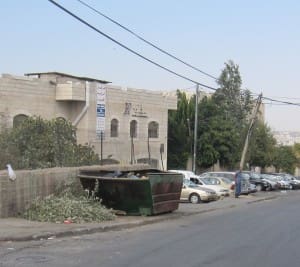
This trash container sits on the block where my youngest daughter goes to school. Can you see the school just beyond the trees on the left? It’s a big school: thirteen grades with 3-5 over-enrolled classes per grade. Hundreds of children have to get to and from the school every day, their parents negotiating the narrow street made even more narrow by the volume of traffic, and the fact that there only about 15 parking spaces so parents park on the sidewalk and double park on the street during drop off and pick up times.
The school is in East Jerusalem – the part of Jerusalem that Israel annexed illegally and has cut off from the rest of the West Bank with an 8-meter high concrete separation wall, checkpoints, and Jewish settlements. Palestinian Jerusalemites pay taxes to the Jerusalem Municipality, part of the Israeli governmental system, but the services we get are inferior. This trash container symbolizes, for me, that Palestinians in Jerusalem are, at best, neglected.
Notice that the trash container, like many others, fills the entire sidewalk. That means that pedestrians who need to pass by the trash container have to step into the street. Watch a few seconds of this video (by clicking on the image below) to see the result: Children step into the street; cars come from behind them at very close proximity and often too fast.
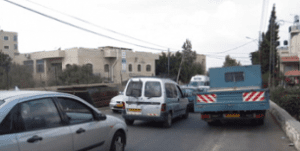
Accidents do happen, and I didn’t want anyone to get hurt. So yesterday I took myself down to the Jerusalem Municipality to ask the sanitation folks to move the trash container to a safer location.
I entered the parking structure and leaned out my window to ask the guard if I was in the right place. He shouted (I think), “Pay when you leave!” so I drove down 5 levels and parked. All the signs were in Hebrew – no English (okay) and no Arabic (despite that it is also an official language of Israel). I made my way through the beautiful open square all the while thinking “we don’t have such nice landscaping on our side of town.”
Several different, friendly Israelis directed me to the sanitation department.
But none of the professional staff spoke Arabic or English. I attracted a small crowd of employees who chattered loudly to one another and waved their hands not knowing what to do with me. Finally a janitor came forward to translate. I explained to him about the trash container. He explained it to them. They told me to call 106 and make a complaint, but that I needed the street name and address. Street name? We don’t use street names. Addresses? We call the buildings by the name of the owner. I told them it was near the school and that would have to do. When I doubted that the complaint line staff would speak Arabic, the woman picked up the phone on her desk and dialed. She pushed this and that and handed me the phone: “I selected Arabic,” she told me through my trusty janitor friend. I waited. There were many announcements in Hebrew and I was supposed to press something, but who knows what. The woman hung up and called again.
The woman got me into an Arabic queue, but the operator who answered didn’t speak Arabic. Luckily, she spoke English. I asked her to arrange to move the trash container to a location where it would not require children to walk in front of moving cars. “Get the record number!” the woman who was helping me said, but the operator on the phone didn’t want to give it to me, or maybe she didn’t know what I was talking about, or maybe I didn’t know what I was talking about. I handed the phone to the woman at the desk and she wrote down the number.
I retraced my steps (again noting the big, beautiful expanse of public open space) and got my car. Five levels up, I couldn’t get out of the lot. You have to pay 12 shekels at the machine on the first floor. Is that what he meant by “Pay when you go out”? I had to go re-park my car again! And of course the parking ticket machine on the first floor is in Hebrew and Russian. Luckily another nice Israeli came along. Not only did he work the machine for me, he also gave me change for the only bill I had, which was too large for the machine.
Wouldn’t you know it? The exit put me heading straight into the heart of busy West Jerusalem traffic, the opposite direction to where I live. It took 25 minutes to turn around. I am not exaggerating. By the time I got home, I was exhausted. I’d been gone for hours. I have a PhD but the whole experience made me feel as if I had regressed to first grade. It is no wonder that Palestinians do not like to engage with the Municipality or any official Israeli body. The system is not meant to serve anyone, but especially not Palestinians, and no one makes any effort to hide that fact.
My complaint number? It’s 16737.
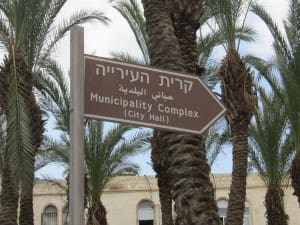
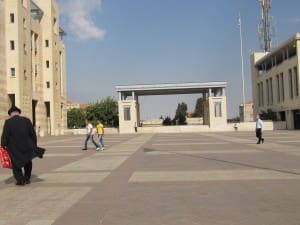
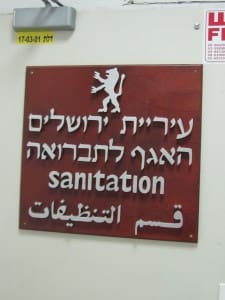
I’m tempted to engage in some eco-action-tourism and come over there and move that dumpster. What would happen if a small group of anonymous American citizens moved the bastard in the middle of the night? Would the bureaucrats even notice? Just wondering. Totally hypothetical question, of course.
I had to think about how to reply to your comment. I’d LOVE to have you visit, but why should you come move them dumpster when we could move it ourselves. Then I got this email: We had something like that trash can happen in Ann Arbor…so bunch of us in the neighborhood gt together, shoved it aside with the help of many many hands, swept up the mess around it, replaced it with a new brightly painted and decorated (by the kids with flowers and birds) . Is that something that would get folks in great trouble in E. Jerusalem??? or do I just not understand.? We got into a bit of trouble at the time that we did it in A.A. because it was in the part of the city where a lot of poor black folks also live and it was always pointed out as symbolic of “the mess that black folks make”
I answered her: There is truly a serious lack of initiative here in Jerusalem. I think it’s because people are scared of getting in trouble, and with good reason. Also, there’s a lot of learned helplessness. And people are suffering from broken community. And people are tired.
But I need to think about this some more. In the meantime, I would LOVE to have you come, and maybe we can recruit some folks to push the damn thing. It’s a very provocative idea!
I thought perhaps American tourists would be harder to punish than locals.
Usually that is true. That’s one reason why there are several international non-profit organizations that act as “accompaniers.” All the do is walk Palestinian children to school if they have to pass settlements, walk farmers to their fields, etc. Their presence probably does decrease attacks (though not eliminate them!), and when there are attacks, there is someone there to bear witness. The violence is less frequent in Jerusalem, but it does happen. This is a long way of saying that you are welcome here anytime, my dear. I will be thrilled to show you around. And if the dumpster is still there (which is was earlier today), then we shall move it! If not, we can definitely find other good things worth doing.
I was in Israel in 1980, I’d decided to try and live on a kibbutz (It didn’t work out) and the story you tell sounds very familiar, as I tried for days to get some information at the port of Haifa about my container of personal belongings. I was one of about a hundred souls, all new to the country, all put through the beaurocratic ringer. Nothing was solved for months !
So I think your story is about the unbelievable beaurocratic insanity of that country, not specifically anti-Palestinian sentiments. Of course these sentiments and attitudes do exist, and I despise them, but like all countries in that part of the world, people with uniforms, and in positions of even limited power, seem to spend their lives making simple issues complicated and untenable. And, nothing has changed.
You are absolutely right. There’s something extreme and almost surreal about Israeli bureaucracy in general, and that makes life harder for everyone. But in my experience, no matter how hard it is for Israeli Jews, it is even harder for Palestinian citizens of Israel, then harder still for Jerusalemites, who are merely “residents,” then even harder for West Bankers, very much harder (if you can imagine) for Gazans, and with refugees at the bottom of the very long food chain.
The reason I decided to write about the trash container was less because of the bureaucracy, but because of the unique and difficult experience that Palestinians face trying to get their rights from “others” who do not speak their language or acknowledge their rights. I’m not even Palestinian and I found it dehumanizing to drive to a “foreign” place and try to convince people to do something that they don’t care to do because they simply don’t care.
Every time I read your posts, I am getting so so depressed, asking myself when and how can it be changed? How do you manage to survive and NOT get crazy??
So, I wish you a lot of strength, courage and humor to survive..
Love Claudia
Oh no! I don’t want to depress you! For YOU, Claudia, I promise I will do a multi-part series called, “Things I love about Jerusalem.” There are many things to share! I concentrate on the problems because I want people to be informed and motivated to engage in social change in whatever way they can given their location and circumstances and interests.
Well done for persevering…don’t stop! But if it’s any comfort, UK bureaucracy (granted, without the racist element Palestinians have to contend with)isn’t all that great either.
One time I was returning to Jerusalem from Jordan across the Allenby Bridge and an Israeli guard asked me to spread by clothes on the metal table so she could inspect them. I refused. I told her (in English) that I didn’t want to spread my dirty underwear in front of the 400 people waiting in the hall. The woman gasped apologetically and said, “Of course! Let’s go over to this private place and I’ll inspect your bag there.” When I said, “Why do you make the others spread their clothes out in public but not me?” she said, “Oh them? They don’t care.” THAT’S the attitude that makes you so tired and sad that just one “interaction” with Israel is enough to make you go home to bed sick for two days.
For a country that tauts itself as the only democracy in the Middle East, the Israeli government seems as willing to provide services to its citizens as some run down African dictatorship. These tetanus filled trash bins are case in point.
This is a sad state of affairs. All that is described is an example of making Palestinians miserable so they will go away and live some where else. It is of paramount importance people understand Palestinians living under the jurisdiction of the Jerusalem municipality are paying taxes equivalent to the Jewish/Israeli citizens living in Jerusalem but the difference in services is appalling. And it gets worse. The Jerusalem municipality encompasses many Palestinian villages and towns surrounding Jerusalem that look like slums not only from garbage but lack of proper basic government infrastructure and garbage is piling in these towns and villages at an alarming rate. People need to know that the Palestinian Authority is not allowed to “touch” these places and that these people pay taxes to the Jerusalem municipality.
True. True.
Yes there are differences between treatment of Jewish and non-Jewish citizens, but most Jerusalemite Palestinians are not citizens. They are residents. The difference in treatment is even greater.